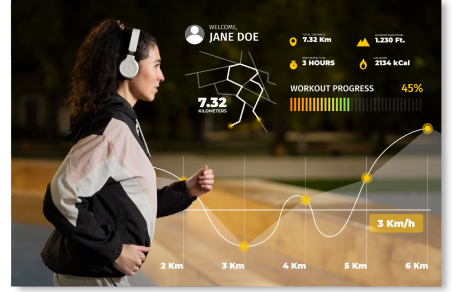Industries
Sports
Sports Industry
Information Technology has revolutionized the sports industry in recent years, transforming every aspect from player performance to fan engagement.
Advanced analytics and data-driven insights have become invaluable tools for coaches and athletes, helping them optimize training, strategize, and prevent injuries. Technologies like virtual reality and wearable devices have enhanced athlete preparation and rehabilitation.
The digital landscape has amplified fan experiences, offering immersive live streams, interactive apps, and social media engagement, fostering a global community of sports enthusiasts.

As technology continues to evolve, IT will remain a driving force behind the growth and innovation of the sports industry, both on and off the field.
Sports Industry IT Challenges

The sports industry faces several IT challenges in its quest for innovation and efficiency. Firstly, data management and security are paramount, as massive amounts of sensitive information, from player stats to fan data, require protection against cyber threats.
Integration of diverse systems and technologies is another hurdle, as the industry adopts wearables, IoT devices, and analytics tools, necessitating seamless interoperability.
The fast-paced nature of sports demands real-time solutions, from instant replay in broadcasts to timely player performance analysis. Balancing these demands with budget constraints can be challenging. Lastly, ensuring accessibility and inclusivity in digital experiences for fans of all backgrounds remains an ongoing IT challenge. Tackling these issues is crucial for the sports industry to continue evolving in the digital age.
How Aerial Teknology is Helping the Sports Industry?
Aerial Teknology is a digital marketing agency providing high-end IT services to businesses across the globe. The IT and digital services have transformed the sports industry in profound ways, revolutionizing everything from athlete performance and coaching strategies to fan engagement and revenue generation. Here is an in-depth look at how IT and digital services are benefiting the sports industry:
Player Performance Analysis
IT systems and advanced analytics have become indispensable for analyzing player performance. Athletes wear sensors and use wearable devices to track movements, collect biometric data, and monitor their health. This wealth of data allows coaches to make data-driven decisions, optimize training regimens, and prevent injuries.


Real-time Data and Insights
IT provides real-time data during games, offering coaches and players instant insights into performance. From analyzing opponent strategies to evaluating player movements, this information enables quicker adjustments, improving the overall quality of the competition.
Fan Engagement
Digital services have transformed the fan experience. Fans can watch games from anywhere in the world through live streaming platforms and enjoy immersive content through augmented reality (AR) and virtual reality (VR). Interactive apps provide real-time statistics, replays, and even allow fans to influence the game through live voting and engagement.

Social Media and Marketing
Social media has become a critical tool for sports marketing. Teams and athletes leverage IT to build their online presence, connect with fans, and promote events. Digital advertising and targeted marketing campaigns help attract and retain a global audience.
Ticketing and Access Control
Digital ticketing systems and access control technologies simplify the ticketing process for fans while providing teams with valuable data. Mobile apps and QR code-based entry systems streamline access to stadiums and arenas, enhancing security and the overall fan experience.
Broadcasting and Streaming
IT is at the core of broadcasting and streaming sports events. High-definition cameras, sophisticated editing software, and cloud-based platforms ensure smooth live broadcasts and on-demand access for fans worldwide.
Data Security and Privacy
As the sports industry handles vast amounts of sensitive data, cybersecurity is paramount. IT experts work diligently to protect against data breaches, safeguarding not only player information but also fan data and financial transactions.
Fantasy Sports and Betting
The digital revolution has propelled the growth of fantasy sports and sports betting industries. Online platforms enable fans to create their own teams, compete with friends, and even place bets on various aspects of games. These platforms rely heavily on IT to manage user accounts, transactions, and odds calculations.
Sponsorship and Revenue Generation
IT helps teams and leagues attract sponsors and generate revenue through data-driven partnerships. Analyzing fan demographics and engagement metrics allows for more targeted and lucrative sponsorship deals.
Event Management
IT systems assist in event planning and management, from scheduling to ticketing and security. This streamlines operations and enhances the overall experience for athletes, fans, and staff.
Future of IT in the Sports Industry
The future of Information Technology (IT) in the technology industry promises to be a dynamic and transformative journey, with several key trends and developments on the horizon:
- Predictive modeling and machine learning will provide coaches with real-time insights, helping them make data-driven decisions during games and optimize training regimens.
- Interactive apps and personalized content will deepen the connection between teams and supporters.
- Wearable devices will become more integrated into sports, providing athletes with real-time health and performance data.
- The esports industry will continue to grow, and IT will be at the forefront of its expansion. Esports relies heavily on IT infrastructure, from online streaming platforms to the development of esports-specific technologies.
- Sustainable venue management, eco-friendly transportation options, and the use of renewable energy in sports facilities are all areas where IT can contribute to reducing the environmental impact of sports events.
- IT will facilitate the globalization of sports by enabling teams and leagues to reach international audiences through digital platforms and social media, transcending geographical boundaries.
The future of IT in the sports industry holds immense potential to enhance player performance, fan engagement, and the overall sports experience. As technology continues to evolve, the integration of IT will be instrumental in shaping the way we participate in, enjoy, and interact with sports in the years to come.


